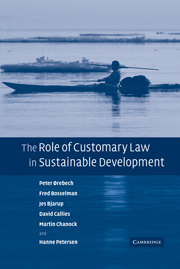Book contents
- Frontmatter
- Contents
- Preface
- Acknowledgements
- Table of cases
- List of international conventions
- Introduction
- 1 The linkage between sustainable development and customary law
- 2 Three case studies from Hawaii, Norway and Greenland
- 3 Social interaction: the foundation of customary law
- 4 How custom becomes law in England
- 5 How custom becomes law in Norway
- 6 Adaptive resource management through customary law
- 7 The place of customary law in democratic societies
- 8 Customary law, sustainable development and the failing state
- 9 Towards sustainability: the basis in international law
- 10 The case studies revisited
- 11 The choice of customary law
- 12 Conclusion: customary law in a globalizing culture
- References
- Index
- Authors index
8 - Customary law, sustainable development and the failing state
Published online by Cambridge University Press: 18 December 2009
- Frontmatter
- Contents
- Preface
- Acknowledgements
- Table of cases
- List of international conventions
- Introduction
- 1 The linkage between sustainable development and customary law
- 2 Three case studies from Hawaii, Norway and Greenland
- 3 Social interaction: the foundation of customary law
- 4 How custom becomes law in England
- 5 How custom becomes law in Norway
- 6 Adaptive resource management through customary law
- 7 The place of customary law in democratic societies
- 8 Customary law, sustainable development and the failing state
- 9 Towards sustainability: the basis in international law
- 10 The case studies revisited
- 11 The choice of customary law
- 12 Conclusion: customary law in a globalizing culture
- References
- Index
- Authors index
Summary
Beyond Blackstone, Maine and Weber
The argument in this chapter is that in order to understand the possible uses of a customary law in the third world, where many of the looming environmental crises are, we need an account of the development of the idea of customary law there, and that this will be one that differs from custom as law in European states and European jurisprudence. In particular the historical trajectory, and a new jurisprudence of customary law, will have to encompass not only the role of custom tolerated on the fringes of powerful state legal systems, but its role where states are inadequate or incapacitated. Furthermore, it will need to take into account, which the jurisprudence of custom in European state and legal systems has historically not done, of the growing role of international organizations as participants in governance, and of international law in validating customary laws.
The narrative of the customary law in this chapter is not situated within European nation-states, and does not revolve around the jurisprudential issues which arose, historically, out of the increasing centralization of these states and the claim of the centre to control, and to make, law. This chapter is concerned with imperialism and its continuing aftermath. In the European Empires the laws of the colonized were displaced and became, in relation to the laws of the colonial state, similarly placed to customary law in Europe.
- Type
- Chapter
- Information
- The Role of Customary Law in Sustainable Development , pp. 338 - 383Publisher: Cambridge University PressPrint publication year: 2006
- 4
- Cited by



